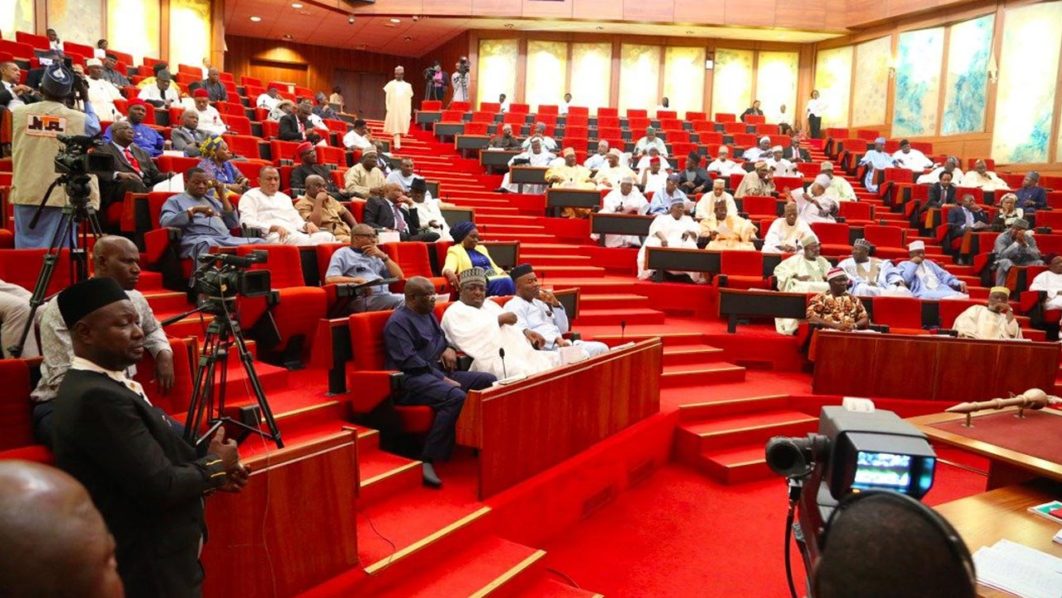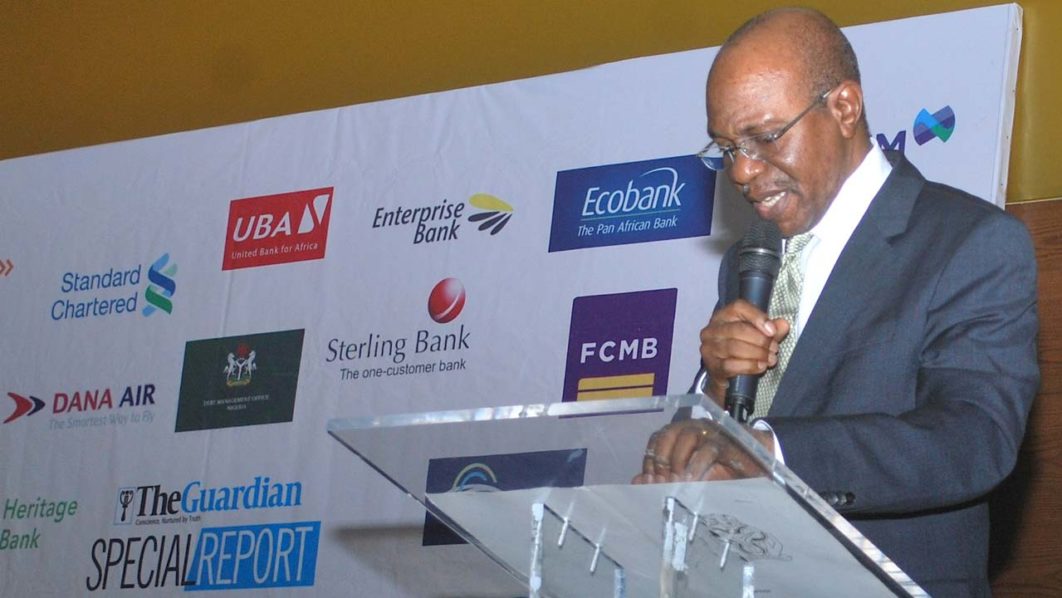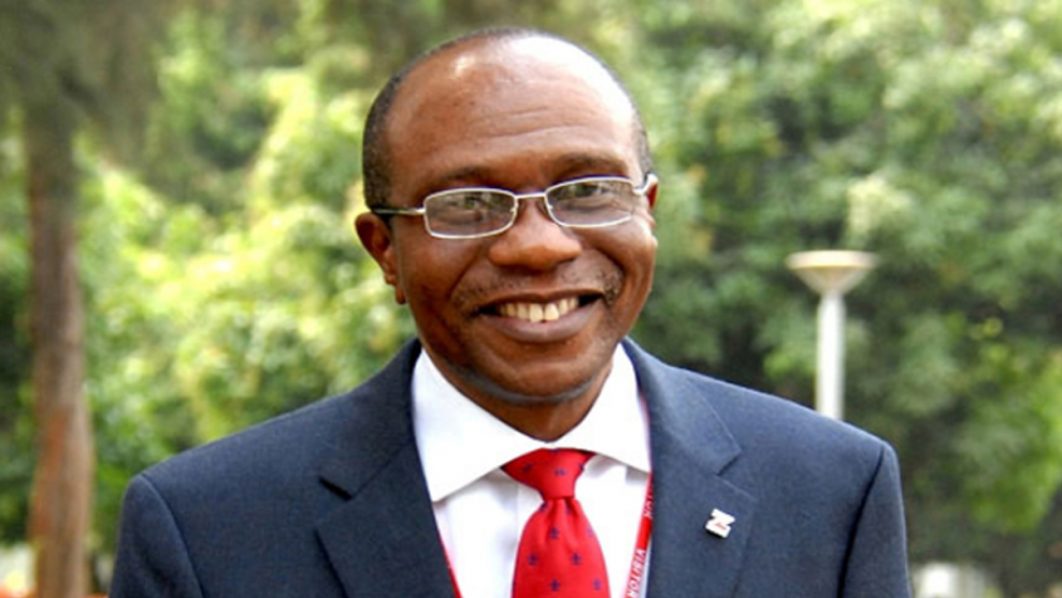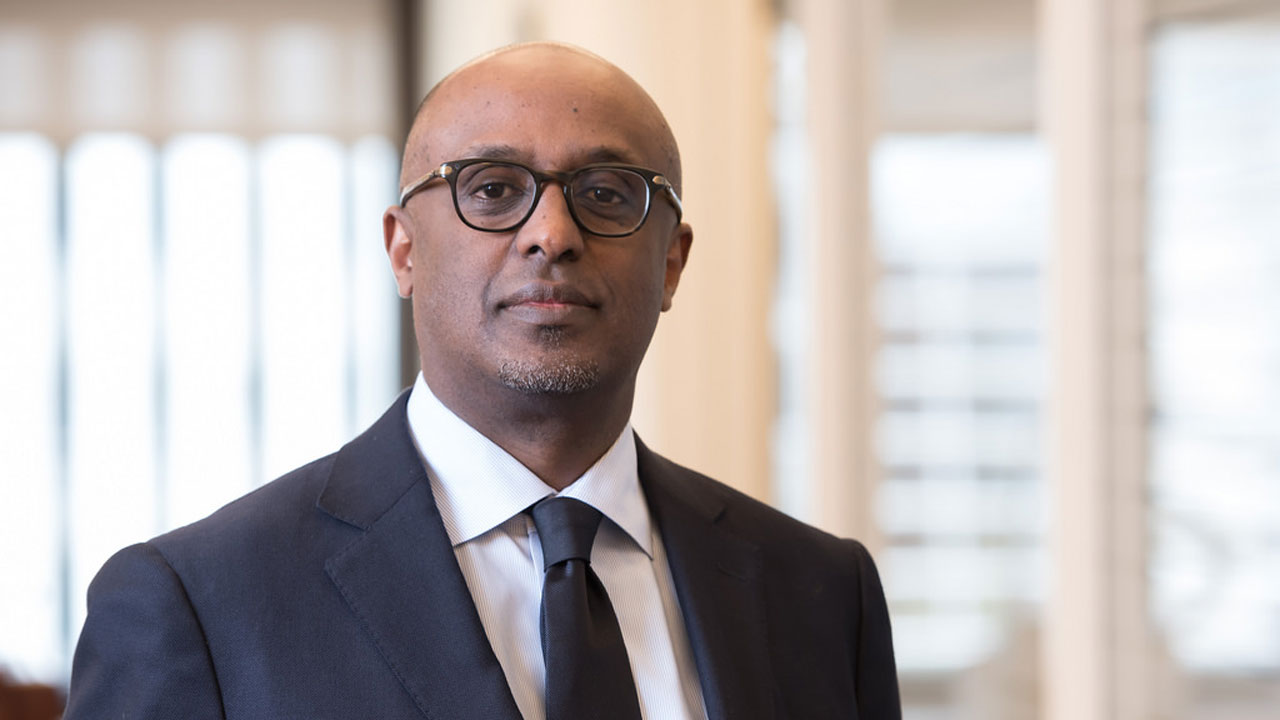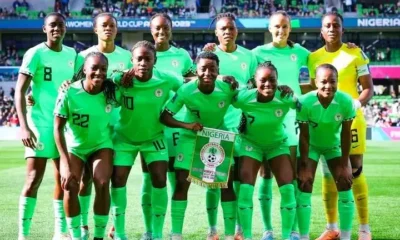The CBN Governor, Godwin Emefiele discussing with members of Nigeria Newspaper Proprietors Association of Nigeria NPAN, spoke on matters regarding the current economy recession, such as causes and efforts being made by government, monetary and fiscal policy authorities to revive the economy. Here are excepts.
Nigeria is in recession, the first in decades or few decades, one or two decades. Things are bad, people are suffering, Mr. Governor, how did we get here?
Thank you very much for that question. I think I must apologise when you say that people are suffering. I must apologise that this is happening to our people, but I must confess that what is happening today is as a result of a global crisis. Global crisis in the sense that we have seen commodity prices dropping, we have seen geo-political tension, all around the world. Here you are talking about political tension between Russia, and Ukraine while indeed the US and EU are on one side watching.
Political tension between Iran and Saudi Arabia trying to play their game as usual; and of course the US Fed’s actions since 2009. Following the mortgage crisis of 2009 which started in the USA, there have been a couple of actions which , given the size of US economy in the world, has had certain impact, both positive and negative on emerging markets and frontier markets, where Nigeria unfortunately stands today.
But I think when you want to address the issue of how we got here, it is important for us to go back into history, go back into history to begin to tell ourselves or remind ourselves there was a time in this country when Nigeria survived only on revenues from agricultural produce, there was a time it survived from revenue from groundnut pyramids in the northern part of Nigeria, there was yet a time when Nigeria survived from the revenues from the western part of the country, and I am talking about from cocoa, to the extent that the tallest building at that time the Cocoa House, was built from the revenue of the export of cocoa, there was a time when this country survived with revenue the country generated from the production and export of palm oil and palm oil products in Nigeria from Mid-western and the south –eastern part of the country.
At that time, I am talking about the fifties and the sixties and indeed up to the early nineties, Nigeria was the largest producer and exporter of palm produce in the world.
Unfortunately, we abandoned these sectors because we found oil. I wish what we did at that time was to ensure that we held strong to our potential in the agricultural sector, if we had held strong to our potential in the agricultural sector, in the same vein held strong to the potential that we found because we found oil in Nigeria our story would have been different today.
Unfortunately, what happened was that, because we found oil, we let our guard down in the agricultural sector, and I will give you an example, this for me is a case of a country that unfortunately did not plan properly. Example is a country like Norway. Norway is a country with a population of less than five million people. Norway produces agricultural produce particularly fish.
It produces and exports fish today, Norway produces also crude oil, to the extent that today Norway is a country that has one of the highest investments in the sovereign wealth funds. Norway indeed has $873bn in its sovereign wealth funds. Notwithstanding having $873bn in its sovereign wealth funds Norway also takes very seriously the output from fish production, to the extent that the country survives on an annual basis, from revenue that it generates from the export of fish (aquaculture).
What does the country do with revenue from crude? It invests it, and at every point the country is about to use the funds from crude oil, it only uses it for infrastructure purposes, that is a country that has planned for its people. Soon after we introduced the Foreign exchange restriction on the importation of fish, the country’s farmers started complaining to the extent that the Parliament in Norway has met twice to see to how to ameliorate the adverse impacts of not being able to export fish to Nigeria on its farmers. Indeed the country has sent several trade delegations to Nigeria to encourage us to lift the restriction so that they can export fish to Nigeria and we in turn pay them our hard earned dollars which we do not have at this time.
What we should all realise is that, by allowing the import of goods that can be produced in Nigeria , we export wealth and jobs to those countries and import poverty to our country.
But, unfortunately we didn’t plan this way for our people and that’s why we are where we are today, and I’ll give you a few examples again. In September 2008, Nigeria’s FX reserve stood at $62bn, what did we do with $62bn? At a time when crude oil price was at about N120 per barrel, what did the country do? What we could have done is save the money.
If we couldn’t save the money, Invest it in infrastructure, invest in industry; invest them in infrastructure and industry that would grow productivity and the wealth of our people. But what did we do? I’ll give you an example, the Central Bank of Nigeria of that time went about licensing class ‘A’, class ‘B’, class ‘C’ bureau-de-change. For class ‘A’ bureau-de-change, Central Bank was allocating $1m per week, for class ‘B’ bureau-de-change, Central Bank was allocating $750,000 per week, and for class ‘C’ bureau-de-change, Central Bank was allocating $500,000 per week to each bureau-de-change to the extent that between 2005 when Central Bank of Nigeria started selling dollar cash and 2016 January when we stopped it, the CBN had sold dollar cash of up to $66billion to BDCs. In 11 years, CBN allocated $66bn averaging $6 billion per year.
If this didn’t happen, we would comfortably be having well over $90bn in our reserve account today and we will not be struggling to pay our bills today… If we had thought of other ways to utilize our reserves in 2008 when it was as high as $62bn perhaps certainly we would not be where we are. Today we have a situation where at that time, me as an MD of Zenith, MD of the bank, a deputy Governor of Central Bank would call to quarrel with me to say why was I not coming to Central Bank to collect Dollar cash to sell to bureau-de-change.
I was called and asked why some people in Kano, some people in Port-Harcourt and in Lagos were calling to say Zenith Bank was not selling Dollar cash to bureau-de-change but of course the bank didn’t see any serious need to disburse Dollar cash to bureau-de-change at that time. That was what we did with part of our $62bn. I go further, between 2009 or 2010 and 2014 of course you remember 2009 was when we had the crisis, when it started with Lehman Brothers collapse, America pumped a lot of money to stimulate the economy, and as a result of pumping that money, some of those funds flowed into emerging markets including Nigeria. At that time again Nigeria removed all forms of capital control to encourage the flow of capital into Nigeria. So what happened during that time, in 5 straight years we saw crude price at above $105 per barrel for 5 straight years. That period we also saw unhindered flow of capital into emerging market into Nigeria; to the extent that by 2013, we had $23 billion in capital flows into Nigeria.
What did we also do? The CBN started encouraging Nigerians to buy shares/ securities abroad. Although the dividends and proceeds of sale of the shares were to be repartriated through the CBN, we do have any records to show that the dividends and proceeds of share sale were repatriated.
People just had all the discretion to transfer funds as wished; just because we thought we had a lot and didn’t think about a day like today when crude prices will be so low. We should have at that time built our reserves. What did we do with our reserves at that time. I repeat those were some of the actions we took as Central Bank that resulted in the situation that we find ourselves today.
Now I want to take us back a little. In January 2014 the country had forex reserve which stood at $40.6bn at that time when crude price was about $110 per barrel. Sometime about 2013, September 2013,the country was generating from crude oil export on a monthly basis average of about $3.2bn. By June 2014 when I took over as the Governor of Central Bank of Nigeria, reserves had dropped to $37bn and crude price was about $108 per barrel. At that time receipts from FX crude sales had dropped to just about $1.7bn monthly. Soon after that we saw the crisis all over again and between that August and September 2014, up to this time which is about 2 years, we have seen consistent drop in the prices of crude to the extent that by march 2015, 2015 precisely our reserves had dropped to $31bn dollars. At that time crude price had dropped to about $48 per barrel and at that time the country’s receipt from export on crude had dropped to about $1.3bn at the same time, the demand for foreign exchange, the demand for imports remained high.
You liken it to a situation where you have a man who has 3 children, and on a monthly basis, he used to earn N10,000 when things were good. And how did he distribute the N10,000, he gave each of the children, N2,500 for their upkeep and of course he had N2,500 for himself. Unfortunately, when things became bad like we are now, his salary had dropped from N10,000 to N2,500. unfortunately the 3 children still wanted to continue to collect N2,500 stipend. So how would daddy survive, how would daddy fend for the family.
All he needs to do is to think about a couple of options. Either to work harder to earn more money which is to increase supply or to work harder and begin to ask the children really what were you doing with N2,500 monthly allowance when things were good because things are no longer as good as they were before so we begin to look at what you are really spending on, were you using it to buy hem instead of using it to buy egg or using it to buy some frivolities that dad will begin to ask you how you spent the money. That is the situation we find ourselves today. And when this happens, we started by saying fine, there was a need for an adjustment in the currency. We adjusted the currency from N155 to N168 sometime around November 2014.
As if that was not enough our friends kept saying that our currency was over-valued and we asked a few of our friends if you think the currency was over-valued what do you think it should be at, some said well N180 will be fine, some said N190 will be fine and by March just to satisfy them, so that the FX supply can come, we adjusted to N197. We went back and said look we have N197… Is there a way you can come back again and lets begin to see business as usual, they said well sorry we are not convinced, the fundamentals don’t look right.
For that reason we are not coming unless you continue to adjust and we said we could not continue to do an indeterminate adjustment to the currency. Of course they were not happy with us and we kept faith with the fact that we felt N197 to a Dollar was adequate and appropriate at that time. Of course we held faith and after that, we began to say what were the items we were importing? We went into a demand management mode and we said for now lets leave it the way it is, lets look at what are the items that we were consuming. To give you some perspective, in 2005, Nigeria import bill was only about N70b. By 2015 Nigeria’s import bill had risen to about N790billion.
What were we consuming? We needed to be sure that what we were consuming at the time when we didn’t have foreign currency. We began to ask ourselves are these things producable in Nigeria today. And in the midst of it, we found that importation of petroleum products was taking about 30% of our import. Importation of items like rice, like fish, like sugar, like tomato, like what people call tooth-pick and the rest of them were consuming about 10 – 15%. We felt that if there was an opportunity for us to curb the demand for these items, then we should be able to see demand at a level where it could be close to supply for us to have an appropriate price for the currency.
And that was how we started to emphasise diversification of the economy. Let us grow our rice in Nigeria and again I will give you an example. I was on my way abroad on an official trip, I met a gentleman whose company produces aluminum cans and he suggested to the Governor, at this time when there is no foreign exchange, we need to look at aluminum can. He said there are some of our companies who import aluminum can for beer and soft drinks. We can produce it! Today, because we included Aluminium cans in the list of 41 items their sales have gone up tenfold.
We also have a company that produces starch and glucose from casava. They went to some of their customers that were importing this item and said, look , we can produce this glucose and starch for you. The importer told them that “we would come to see you when our stocks go low”. Their stocks never went low and they never did because they were still importing. After the foreign exchange restriction, the importer’s stock truly went low and they had no choice but to patronize the locally made glucose. Today the turnover of the company producing starch /glucose has gone up astronomically and they have created more jobs for Nigerians. Gentlemen, by the foreign exchange restriction on the importation of toothpick, we now have toothpicks being produced at Sango Otta , in Ogun State from bamboo. That company has created jobs for Nigerians. That, in my view is the positive impact of our demand management strategy.
Today, we have a company that has embarked on the establishment of factories to produce 650’000 barrel per day of refined petroleum products, the same company will be producing polyethylene and polypropylene granules and fertilizer. This company plans to invest up to $11 billion in these projects. Gentlemen, by 2017/2018, we will be self-sufficient in local production of petroleum products, polypropylene and fertilizers. These are the positive effects of our demand management strategy. So it has worked. In a time of recession you need to spend to achieve growth. However, on the other hand, you have to be very careful so that excessive spending does not result in sky-rocketing inflation. You can imagine that as at December 2015 the rate of inflation was just about 9% but below 10% in January and now, in fact as at March 2016 it has moved from 10% to 17.6% that is the reason the CBN considered it’s mandate of price stability as core. That is why at the last MPC meeting, members tried to weigh the balance between growth and inflation and noted that if we allow inflation to grow at the rate that is so astronomical and uncontrollable, that could be a problem. And that is why we decided to alter the rate. But the primary motive why we altered that rate in upward direction is to attract foreign direct investment inflow. We did that to achieve the higher yield.
How do you expect the recession to be over with prices going up and manufacturers lacking raw materials?
Let me say this I must confess that I wasn’t optimistic that the FDI will come initially but with what we have seen in 3 months, almost $1b. I feel confident and very confident that there will be more inflow into the system and more and more people will have foreign exchange available for them to do their business. That will improve the industrial capacity.
The rate may be high now, but there’s high possibility that with more availability of foreign exchange , the rate will come down. I am very optimistic that a lot of positive things will happen. Now in terms of short run, I have talked about encouraging inflows to come in.
I have talked about how the fiscal authority is trying to push in liquidity to stimulate consumption, demand consumption expenditure and of course, when consumer consumption is stimulated, demand for goods will go up and if these demand goes up, then you will see the activities pick up.
If we maintain a steady course in the way we are going, and if all those who have foreign exchange repartriate them , more and more people will have foreign exchange to do their business, that will improve industrial capacity.
The rates may be high now but now there is the possibility that as we receive more and more foreign exchange, the rate will come down. I am really optimistic that this will happen. Also in the short run, we can sell assets. You will recall that as at April 2015, that I had an interview with Financial Times of London during which even before the government came on board, I had opined that there was need for the government to scale down or sell off some of its investments in oil and gas, particularly in the NNPC and NLNG as at that time when when the price of oil was around $50-$55 per barrel. We actually commissioned some consultants that conducted the study and at the end of that study we were told if we sell 10% to 15% of our holding in the oil and gas sector that we could realize up to $40bn.
Unfortunately, the markets have become soft. Now if we choose to do that now, we could still get $10, $15b or maybe $20b. If we have that kind of liquidity, it will be easy for us to really stimulate the spending and also to turn the economy around.
That proposal is still on the table because I have also heard that some of our colleagues in the FEC have talked about it and a lot of people too. If we take that option, I am optimistic we will be able to stimulate the economy and earn foreign currency that we can really use to kick-start, stimulate the economy. Don’t forget, even in the US, when the economic crisis started, the US government stimulated the economy with about $900bn and subsequently injected $85bn monthly for an extended period of time… In Japan and Europe with low rate of inflation, in fact they have negative interest rate.
Anytime they want to stimulate the economy by liquidity, if you push the inflation it will not affect prices. We are trying to fight inflation to remain at a point where it will not be too high and become injurious to our people. Measures to get out of the recession and government intention to come up with a bill to shorten the procurement process and the absence of chief executives in most of the government agencies where the spending actually take place.
Unfortunately, I don’t agree with you because we have cabinet members and most of these agencies are headed by ministers and we have people who are working in acting capacity. There are other people who are there as Executive Directors, and I do know that once we are able to shorten the procurement process, the absence of chief executives will not hamper spending.
An alignment between the monetary policy that you are driving and fiscal end of it. You are talking about more spending and the fiscal side driving at more revenue through taxation. How do you align the monetary with fiscal so that you can drive common purpose. Let me thank you but also assure you that both the monetary and fiscal are working together and that is why you could see a situation where today even where we have revenue shortage or deficit, the monetary authority is trying to bridge the gap.
We said that we can give you a bridge to go ahead and spend when you obtain the foreign loan or when your revenue improves you can repay the bridge that we have created for you in order to stimulate spending. That is a practical case of collaboration between the monetary and fiscal authorities. Now, when you talk about increases in taxes, there have been a lot of proposals presented to the federal government that for instance VAT should go up. And I must confess that taxes in Nigeria, particularly the VAT is among the lowest in the world.
In spite of that the government has been very reluctant to increase the VATRate because it really understands the suffering and the yearning of the Nigerian people. But what the government admitted of which you and I also know is that there are so many people side tracking and avoiding payment of VAT taxes thereby hampering the implementation of VAT regime.
However the government is working to widen the scope horizontally so as to capture more people to pay their taxes. That is what I’m aware the government is doing. And not at this time for the government to be pushing for increment in taxes. You have explained how external shocks contributed to the recession in Nigeria but you have not address the issue of internal problems arising from the delay in putting in place the necessary structural adjustments which may have slowed down the economy right from the onset of this recession.
For instance, marketers are talking about stopping the importation of fuel, because of the impact of the fall in the value of the Naira. Also there’s need for rethink about the TSA that’s currently being sterilized in the CBN, of which some of the money could be used to spend our way out of recession. I will take the issue of TSA first. As far as I am concerned TSA is a program that several governments in the past have tried to implement but unfortunately they did not have the will to do so. And I will give you an example.
Is it fair that the government allows ministries and agencies to release its money to the banks and those banks do not pay any interest to the government. At best they pay 1 or 2 per cent but at the same time when government wants to borrow by selling treasury bills, government goes back to these banks and these banks use the liquidity that the government gave through ministries and pass back to the federal government at 12′ 13 or 14 per cent.
This is colossal waste of resources on the part of government. So, people’s belief that because TSA is sitting in the Central Bank it is part of what is causing the crunch , it is not true. Because when government was going to withdraw the TSA, the monetary policy committee also looked at its own ways of releasing some funds into the system through the CRR that was held so that the money cycles back into the CBN so that the government gets its money back. So, I do not agree that the TSA is a major issue here. Secondly, on the necessary structural adjustments, again, it is unfair to blame this government for not taking decisions on structural adjustments and I will tell you this, Normally when you have an adjustment in currency worldwide, those adjustments must be followed with structural reforms. Just as the President talked about, in 1984 currency was about to One Naira to three. After that we went into SAP.
SAP was meant to build structural adjustments or structural reforms but when the crude price started to improve, everybody abandoned the structural reforms and that was why we could not effectively diversify the economy. There was a government that came at that time and said let’s pursue green revolution, and another government said everybody should go and farm. But immediately crude prices started going up, everybody abandoned green revolution, everybody abandoned go back to the farm. And that’s why we are saying now that yes, an adjustment is going on, adjustment in the currency has happened there is a need to follow through with some structural reforms that would lead to diversifying the economy.
How? For instance that we are lucky that we have somebody who has decided to invest in a refinery with the capacity for 650,000 barrels per day. We are lucky, the same person has decided to invest in petrochemical, and fertilizers. These three projects alone are costing nothing less than $11 billion. And these three products, that is petroleum, petrochemicals and fertilizer take nothing less than 35 per cent of our import bill. What happens by the end of 2017 to 2018 when we stop the importation of these products. You will see that we are able to conserve our reserves because the demand for foreign exchange for these items will reduce. What does it take to produce these items? To produce fertilizer you need .gas……..and to produce petrochemical products like polythene you need gas also…….and to produce petroleum products all you need is crude oil. So, all you need to do is to import the machines .
So, I’m saying that the structural adjustment will work. Afterall, the government is pushing diversification the economy. And that items that we are importing and which can be produce in Nigeria must see to it that they are produced here. That is why government has continued to support the restriction on foreign exchange for these items like rice, fish, tomatoes. I have told you the successes we have attained. I can say that for the first time I’m seeing a toothpick that is produced in Nigeria. I was given a sample of that toothpick by the VP on Wednesday. And what does it take to produce toothpick, bamboo and the machine you need to produce toothpick is less than $50,000 to buy the machine.
The machine can be installed in a room that is half the size of this place we are right now. We must embrace structural reforms to the extent that you have to learn lessons as there was a recession and a global economic crisis where your revenue dropped. That drop in revenue went into the valley. When there is structural adjustment program and fortunately your revenue also grows, you adopt structural reform strategy so that where there’s another round of recession, you will be able to withstand it. Because economic crises come in seasons. They come and they go.
When next an economic crisis comes, it’s either that you are at par with it or even stand taller and enjoy growth rather than going into the valley. Those are the kind of things we are talking about. You also talked about petroleum products pricing. Petroleum pricing is something that citizens have taken passionately. I think Nigerians love and trust Mr President that is why despite the increase in the prices, Nigerians accepted it. Why, because they found out that because of shortage of foreign exchange, marketers stopped importing the product. NNPC was saddled entirely with the responsibility of importing petroleum products. Of course, it became so bad that it became embarrassing to citizens to the point that elsewhere people were buying fuel at N86 while others are buying as high as N150 a liter and at N200 in different parts of the country.
People began to agitate that if I could buy at N200 or N150′ well, just make it available. That now informed the decision to increase the pump price from N86 to N145 per liter so that people can move around to conduct their business. Hence, at that rate, it will be possible for them to source their foreign exchange at a price not less than N280 to the Dollar. It is unfortunately this has attracted high rate of inflation. With the rise in petrol price from N86 to N145 which is about 70% increase. Right imagine, a wholesaler from Jigawa or Zamfara, by the increase in petrol price, it means the transporter has no choice than to increase the price of transportation fare by 70%. When tomato lands in Ketu or Wuse market. The retailer gets to the market to buy tomatoes and the wholesaler sells to her plus 70%. That’s the second leg of the 70%. The woman carries the basket of tomatoes to Ketu bus stop and takes taxi. The cab man takes another 70% increase in transportation from Ketu to Obalende which is increment number three. The tomatoes get to Obalende where the woman begins to resell. When you and I now go to buy from her, you can imagine how the 70% scenario has come to affect the price vis-a-vis inflation. If you go to the restaurant, for instance you go to Obalende to buy tomatoes, when you buy the tomatoes the lady who is buying increases the price by 70% and it is used to cook food for the restaurant, what you call ‘mama put’ right? This is four.
Definitely the plate of rice laced with tomatoes and meat that you are going to buy, the price will also go up by 50 %. So in the transmission mechanism, the price goes up 5 times as a result of the adjustment from N86 to N145. That is why the adverse impact on prices has been so colossal on our people and Government will continue to do its best to moderate and we the monetary authorities will look for our own way to inject liquidity so that what has gone up through the exchange rate the manufacturers can get it through moderated interest and improved industrial capacity. It will help to moderate prices so the impact of exchange rate is not so adverse on prices. It is a delicate balance and we must give credit to the fiscal and monetary authorities for what they are doing to ensure that the impact is reduced and that we turn round the corner as soon as possible.
Source: vanguard.ng



